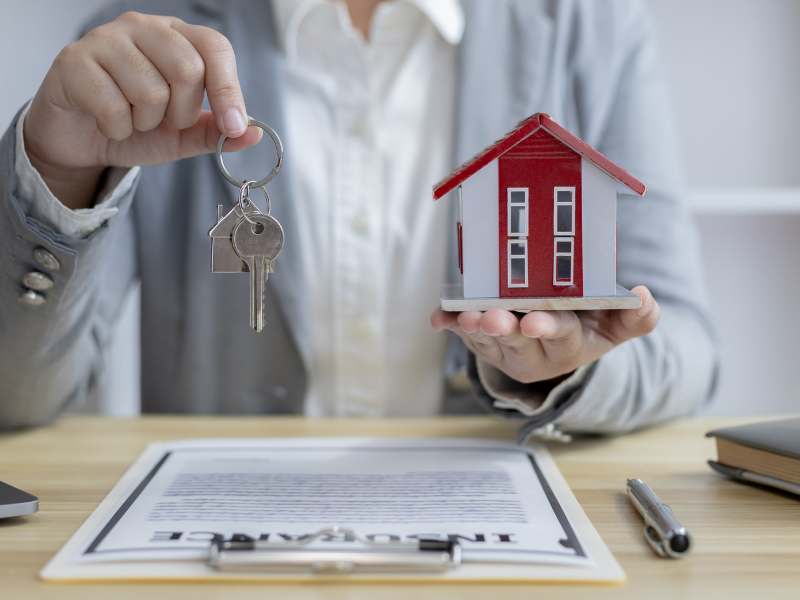Published on May 10th, 2023
Landlords: why do you need to improve your properties’ EPC rating?
From 2025 all newly rented properties will need to have an energy performance certificate of C or above. This means that landlords are going to have to start looking at making upgrades to their homes’ energy efficiency as soon as possible.

From 2025 all newly rented properties will need to have an energy performance certificate of C or above. This means that landlords are going to have to start looking at making upgrades to their homes’ energy efficiency as soon as possible.
Energy efficiency upgrades or home retrofit is a critical process for homeowners and landlords looking to reduce their property’s bills, carbon emissions and improve their home’s comfort. This involves upgrading and modifying a number of aspects of the home; be it the home’s structure and insulation; its heating, ventilation and cooling systems; or appliances around the house such as energy saving lighting or washing machines and fridges.
There’s also the added factor that landlords who had exemptions from the Minimum Energy Efficiency Standards (MEES) applied by the government in 2018 will need to renew or carry out work at the end of this year when these exemptions expire. These exemptions applied if your property’s fabric was likely to be damaged from carrying out the upgrades, if it would cost the landlord more than £3,500 or if it resulted in a devaluation of the property. You can reapply but it’s not guaranteed that you’ll be given the exemption again.
In light of this we thought we’d put together some material that can help landlords kick off changes to their housing stock.
If you’re looking for advice on how to make your properties more energy efficient you can book a home assessment with us, where an accredited surveyor will tell you exactly where your property can be improved and provide you with a plan on how to take the property forward and make it more energy efficient. You can book an assessment here.
Contents:
- Why should landlords improve their properties’ EPC rating?
- What are the changes landlords can make to improve their EPC rating?
- How can Furbnow help landlords improve their EPC rating?
1. Why should landlords improve their properties’ EPC?
Financial
There’s a number of reasons you’d improve your property’s energy efficiency, the biggest incentive might be the financial reward.
In most cases improving the energy efficiency of your property will increase its value, as, should you want to sell it, the reduced energy bills and increased comfort for the new owner will mean they’re willing to pay more. Which, given the increasing cost of energy, is a pretty big deal.
Likewise tenants should be more inclined to pay higher rent for properties where the bills will be lower and they’ll be more comfortable. If there’s less draughts and dampness and if they don’t need to use as much energy to heat the property then they’ll be more inclined to sign for it.
There’s also the rise of green mortgages. The incentives for banks is that if you have a more energy efficient home you’ll have more money to put towards your mortgage as you’re spending less on bills. And the incentive for homeowners is that you’ll have a better mortgage as a result of the changes you make, so remortgaging to a green mortgage can free up cash initially and give you a better fixed deal on your property.
Changes in legislation
The biggest news for landlords is that in 2025 all newly-rented properties will need to have an Energy Performance Certificate (EPC) of at least a C.
For those that aren't aware an EPC is a publicly available certificate that shows how energy efficiency your property is. An ‘A’ signifies the property is fully energy efficient (i.e it doesn’t take much energy to heat up, it doesn’t lose heat through the roof or windows, there’s no draughts or dampness) while a ‘G’ is the worst possible rating.
As part of the government’s 2050 decarbonisation plan it laid out that rented properties will need to have a rating of at least C. This could be followed by further, increased targets every few years.
MEES exemptions are also expiring this year which means that landlords who had properties exempt from making upgrades in 2018 will now either need to reapply for exemptions or carry out work. It became a legal requirement in 2018 that landlords need a EPC rating of at least E, and after 5 years these need to be renewed or updated.
Environmental benefits
The other benefit is that your property’s impact on the environment is improved, be it through clean generation with a heat pump, or reduced energy consumption through better insulation. UK homes account for around 20% of the country’s emissions and so decarbonising domestic properties will be a central route to having a Net 0 nation.
It’s worth considering that the majority of UK homes were built pre-energy efficiency regulations, so will lack adequate and up to date systems to reduce emissions and waste.
As part of this you could also include the wellbeing of your tenants and the impact increased comfort will have on their health. Less draughts and dampness will mean improved living conditions. It may also mean reduced costs for future repairs if you find yourself constantly dealing with these issues.
2. What are the changes landlords can make to improve their EPC?
Landlords can improve their EPC rating through a number of home retrofit measures, some might need to be carried out by professionals, such as replacing your boiler, but some you can carry out yourself:
1. Insulation: The most important changes you can make are to improve insulation in the walls, roof, and floors of your property to minimise heat loss. You could also consider adding cavity wall insulation and loft insulation.
2. Windows and doors: You can upgrade to double or triple glazing to reduce heat loss through windows. And you can install draught-proofing measures for windows and doors to prevent air leakage.
3. Heating system: Opt for a more efficient heating system. Install a condensing boiler for better fuel utilisation and heat generation. Explore renewable heating options like heat pumps or biomass boilers.
4. Controls and thermostats: Increase energy efficiency with programmable thermostats and heating controls. These help regulate temperature based on your needs, optimising energy usage.
5. Energy-efficient lighting: Replace traditional bulbs with energy-saving LED or CFL bulbs. These consume less electricity and have longer lifespans.
6. Renewable energy sources: Consider solar panel installation or other renewable energy systems to generate electricity for your home. This reduces reliance on the grid and lowers your energy bills.
7. Ventilation: Enhance ventilation systems, especially in kitchens and bathrooms, to reduce moisture and improve air circulation. Install extractor fans or mechanical ventilation with heat recovery.
8. Energy-Efficient Appliances: Upgrade outdated appliances such as refrigerators, washing machines, dishwashers, and boilers to energy-efficient models. Look for high energy-efficiency ratings.
9. Water Efficiency: Install water-efficient taps, showers, and toilets to reduce water consumption. This saves on water bills and promotes sustainability.
10. Renewable Heating: Consider installing renewable heating systems like air source heat pumps, ground source heat pumps, or biomass boilers. Reduce carbon emissions and improve your EPC rating.
3. How can Furbnow help landlords improve their EPC rating?
Furbnow is your start-to-finish companion for making your home more energy efficient. We assess your property to give you a detailed plan of what to improve and can then organise and manage the work for you, so that you only need to be as involved as you want to be.
If you’d like to kick off any work, or if you just want to get an idea of what you need you can book a call with us here.
Written by

Oisin Teevan